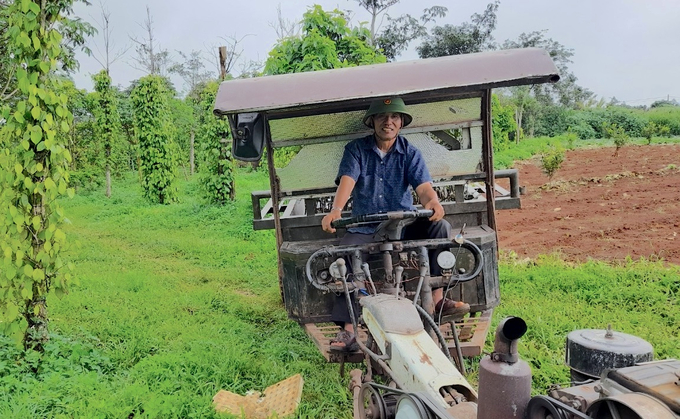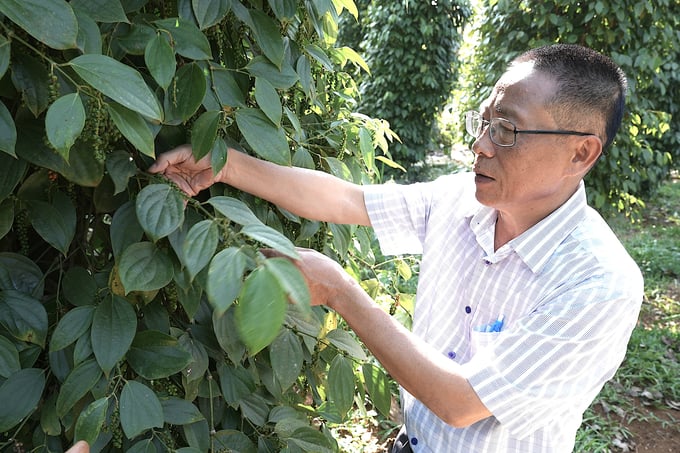November 19, 2025 | 11:10 GMT +7
November 19, 2025 | 11:10 GMT +7
Hotline: 0913.378.918
November 19, 2025 | 11:10 GMT +7
Hotline: 0913.378.918
The Binh Tien Organic Pepper Cooperative (located in Nam Binh commune, Dak Song district, Dak Nong) was founded by Mr Dong Xuan Lien (64 years old) in 2017 with an initial 45 members and over 100 hectares of pepper. Currently, the cooperative has pepper areas certified for both VietGAP and organic farming, and its Nam Binh Tien black pepper product has achieved a 3-star OCOP certification. In addition to supplying the domestic market, Nam Binh pepper is also exported to several countries.

Mr. Dong Xuan Lien, Director of the Binh Tien Organic Pepper Cooperative. Photo: Hong Thuy.
Mr. Dong Xuan Lien, the Director of the Cooperative, shared that over a decade ago, when pepper prices soared, farmers overused chemical fertilizers and pesticides, and exhausted the land's resources, leading to many pepper gardens becoming diseased and dying. This prompted him to establish the Binh Tien Organic Pepper Cooperative with the aim of restoring soil health, protecting the environment and people, and promoting sustainable development to enhance the value of pepper.
“This is the right and only way forward. In 2021, the cooperative's pepper products received a geographical indication certificate from the National Office of Intellectual Property for black, red, and white pepper, and are protected throughout Dak Nong province. This was the 111th geographical indication in the country and the first for Dak Nong province. This has motivated local farmers to raise their awareness and responsibility in building sustainable pepper production areas, preserving their reputation, and enhancing the position of Dak Nong pepper. Currently, the cooperative's products are not only well-received but also fetch prices 20-30% higher than the market”, Mr. Lien said.
Since joining the cooperative and switching to organic farming, his products now fetch prices VND 10-15 thousand higher/kg, and the cooperative buys the produce, ensuring a stable market. The most important thing, he added, is that he feels healthier and happier knowing his land is free of harmful chemicals from fertilizers and pesticides.

Mr. Ho Gam, Chairman of the Dak Nong Farmers' Association, is very impressed with the approach of the Binh Tien Organic Pepper Cooperative. Photo: Hong Thuy.
Similarly, Pham Thi Anh's family in Hamlet 8 (Nam Binh commune) has nearly 3 ha of pepper. In 2020, after joining the Binh Tien Organic Pepper Cooperative, she switched from traditional farming to organic farming. Initially, the pepper plants showed signs of exhaustion, but after two years, the pepper vines began to recover and grow strongly.
Thanks to the fertile basalt soil, the mineral content in Dak Nong's pepper is higher than that of other pepper-growing regions, earning it high recognition both domestically and internationally. As a result, Dak Nong is one of the largest pepper-producing areas in Vietnam.
Translated by Hoang Duy

(VAN) More than 100 shoppers queued for a chance to get a kilo or so of Japanese rice for 500 yen ($3.32) by heaping as much grain into a small wooden box as possible.

(VAN) Benchmark international prices of milled declined in October as harvests started or improved in some parts of the globe.

(VAN) Show cause orders will be issued to retailers who sell imported rice at prices exceeding the maximum suggested retail price (MSRP) of P43 per kilo, Philippines Agriculture Secretary said in a statement on Thursday.

(VAN) Coffee prices on October 20, 2025, remained stable domestically, trading at 113,500–114,500 VND/kg. Similarly, global coffee prices also moved sideways.

(VAN) By October, Vietnam’s coffee exports had surpassed USD 7 billion for the first time and will exceed USD 8 billion within this year.

(VAN) Illinois rancher says Texas, Oklahoma, Kansas lost grass and forage, forcing massive cattle liquidation.

(VAN) Coffee prices on October 12, 2025, remained flat, trading at VND 113,000–VND 114,000/kg. This week, coffee prices continued to decline sharply.